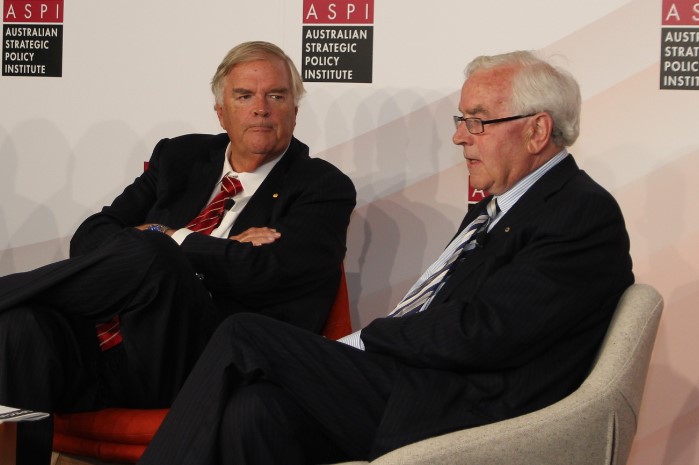
Kim Beazley and Paul Dibb are two tenors of Oz strategy. Each has a distinctive voice. Combine those voices and the power magnifies.
Over four decades, the two tenors have shifted the terms and the nature of Australia’s geostrategic and defence understandings.
Beazley and Dibb deliver policy heft as well as polished performance. They hammer the facts. Yet they can soar and imagine. They riff off each other and do contrasting harmonies.
The twin tenors sing of strategy: the tough job of balancing aspirations and capabilities—ends are infinite, means are finite—to describe possible futures.
Our Oz versions of Pavarotti and Carreras got together on stage at ASPI the other night for a typical bravura show (being Western Australia’s 33rd governor is keeping Kim trim, and he’s a svelte version of Pavarotti).
Dibb reflected that Beazley was aged 36 when he asked Dibb, then aged 45, to write what became his seminal 1986 review of Australia’s defence capabilities.
A 36-year-old defence minister! It was Kim’s dream job. He had the intellect and loved the kit; the superb quality of US kit is a key element of his embrace of the alliance. One reason he was called ‘Bomber’ Beazley is his fondness for lethal military hardware, like the F-111.
History says that for most Oz defence ministers, it’s their final big role in politics. Beazley beat the hoodoo. Getting the job early made defence his launch pad, not his exit point. During that period, the two tenors served up the 1986 Dibb review and the 1987 defence white paper.
With the review and white paper, the duo made significant, lasting changes to the ‘theology of defence policy’.
Originally a geographer, Dibb used geography as both discipline and inspiration for Oz strategy. Australia’s unique geography should determine force structure, not our history of sending expeditionary forces far afield. This brutal logic means the navy and air force get priority and the big bucks, while the army comes third (for a long time, ‘Dibb’ was an army swear word).
Beazley took the logic and enshrined it in the title of his white paper: The defence of Australia.
The young defence minister was formidable in swatting away claims of a retreat to fortress Oz and a breach in the Western alliance. His skills as a politician were simultaneously trained on the US and the Labor Party, affirming the alliance in Washington and cementing it within Labor. Australian defence self-reliance and alliance weren’t in conflict but complementary. Australia alone couldn’t afford what the alliance offers in intelligence, weapons, logistics, science and technology.
The duo can do new songs, as they showed when Beazley launched Dibb’s ASPI report, How the geopolitical partnership between China and Russia threatens the West.
The Dibb warning is that the risk of major-power conflict grows because Beijing and Moscow may act together to exploit what they see as Western weaknesses. The danger, Dibb writes, is of a grand coalition of the two leading revisionist powers, united not by ideology but by parallel grievances:
Both China and Russia are now allied in a quest to refashion a world order that’s safe for their respective authoritarian systems. Both their leaders have reasons to be gratified by global trends and the fact that they’re ‘out-gaming’ the West. Beijing and Moscow probably believe that now is a time of great strategic opportunity, with the Western alliance in disarray.
Unlike in the Cold War, Dibb says, America is incapable of fighting two major regional wars simultaneously. US competitive military advantage is eroding, he says, and America can fight only one major regional conflict while mounting a holding operation in another region.
The Dibb description of the West ‘entering a period of great strategic disruption and instability’ is all the reason you need for Australia to keep inching back up to spending 2% of GDP on defence. Beazley says Canberra must continue pushing the trend towards what defence got in the 1980s, 2.3% of GDP, which would be an extra $5 billion a year.
Beazley says America’s politics clouds Australia’s view of US technical and military capabilities. He says Australia should still bet on the US, understanding that ‘we are so much more dependent now on the Americans than we were’ when he was defence minister.
Australia cannot be defended without the alliance with the United States. It’s as simple as that. If you know the math. If you know the capability. And if you know what we can actually spend—and I’d still say that at 2.3% of GDP—to contemplate a situation without them, you can forget it.
Beazley says the dependence on the US for high-quality military equipment will constrain the way Australia engages with international tensions: ‘That’s something government will need to discuss with the Australian people.’
Dibb and Beazley agree that a central element of Oz strategic thinking—the concept of ‘warning time’—has crashed into China.
For decades, the doctrine stated that Australia would have time to respond to any power-building capabilities to threaten the continent (in the 1970s, ‘warning time’ was set at a decade). Dibb says the government and Defence Department are ‘sleep walking’ around the fact that ‘warning time is becoming shorter and that the management of strategic risk is becoming significantly more demanding’.
The two tenors can still galvanise a gig. The short pop version is in this podcast. The opera-length video is here.

